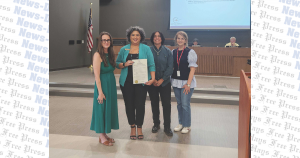The Hays-Caldwell Women’s Center knows that survivors of domestic violence face many challenges even after leaving the abusive relationship.
One of the most difficult can be sharing custody of children with their abuser. Shared custody can provide a way for the abuser to perpetuate the abuse against the victim by using drop-offs/pickups and joint custodial decisions as a means to harass, threaten or further abuse the survivor.
Additionally, the survivor may worry about the children’s safety while they are in the abuser’s custody. These concerns are very valid, as abusive behavior often escalates once the survivor leaves the relationship.
It is not possible for a survivor to control or alter the abuser’s behavior. However, there are steps the survivor can take to manage conflict.
Those tips include the survivor seeking support for themselves and their children. Another is to disengage with the abuser. While it can be difficult, doing so could create a healthy buffer between the abuser that benefits the survivor and their children.
Documenting phone calls, meetings, missed visitations or safety concerns regarding visitations is a helpful tip, along with creating a safety plan with children.
Survivors should also avoid criticizing the other parent, as it’s harmful to children to hear parents speak badly about the other.
A survivor is never responsible for the abuser’s behavior, nor can any of us control the behavior of another.
However, there are always steps survivors can take to reduce risks and increase safety for everyone in the family. For more information on services, or to find out how you can help, contact the Hays-Caldwell Women’s Center at (512) 396-HELP (4357).
Another way you can be proactive in taking a stand against domestic violence is to consider getting involved in your community.
HCWC is always seeking community volunteers to help provide support to victims of abuse. To learn details on volunteer opportunities, please sign up for our next volunteer orientation to be held Thursday, Oct. 20 from 5-6 p.m. To reserve your spot, please call HCWC at (512) 396-3404 or visit www.hcwc.org
Take these steps when co-parenting
Seek support for yourself and your children
At HCWC, we offer many confidential, free services for survivors of abuse, including adult & child counseling, financial and legal advocacy, and emergency shelter. We also recommend reaching out to your network of safe friends and family for support.
Disengage with the abusive ex
This can be very difficult to do, especially when the abuser is deliberately pushing buttons. However, by doing so, you create a healthy buffer between you and your ex that will benefit both yourself and your children. For example, if the other parent is creating conflict during custody exchange, you might choose to meet in a neutral, public place.
Document everything
Write down details of phone calls, meetings, missed visitations, safety concerns regarding visitation, etc. Consider limiting your conversations with the other parent to email or other written, verifiable forms of communication. Share your documentation with your attorney.
Avoid criticizing the other parent
It is harmful to children to hear either parent speak badly of the other as a person, although we can and should say that the abusive behavior is wrong. Focus the conversation on validating your child’s feelings and providing tools for dealing with challenging situations related to the abuse and separation.
Make a safety plan with your children
Make sure children know how to call 911, have both parents’ names, phone numbers, and addresses memorized. Talk about what to do in an emergency, when adults fight, or other unsafe situations.
This article is part two of a four-week series focusing on raising awareness about domestic violence. October is Domestic Violence Awareness month and we hope to educate our community on this very serious issue. Last year, HCWC served 1,872 victims of abuse (face-to-face) from Hays and Caldwell County. 376 of those were child witnesses of domestic violence served in our non-residential children’s program.
Michele Quintin is a Licensed Master Social Worker and Nonresident Children’s Counselor






